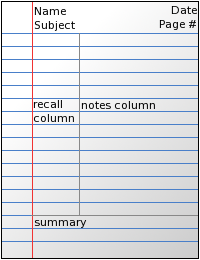Note-taking
Note-taking is the practice of recording information from different sources and platforms. By taking notes, the writer records the essence of the information, freeing their mind from having to recall everything. Note-taking is a critical skill in many contexts, including education, business, and personal life.
History[edit | edit source]
The practice of note-taking has been around for centuries. Ancient scholars, such as Aristotle and Plato, were known to take notes to aid their learning and teaching. The invention of the printing press in the 15th century made books more accessible, which in turn increased the need for effective note-taking methods.
Methods[edit | edit source]
There are several methods of note-taking, each with its own advantages and disadvantages. Some of the most popular methods include:
The Cornell Notes System[edit | edit source]
Developed by Walter Pauk at Cornell University in the 1940s, the Cornell Notes system divides the paper into three sections: a narrow left-hand column for cues, a wider right-hand column for notes, and a summary section at the bottom.
The Outline Method[edit | edit source]
This method involves organizing notes in a hierarchical structure, using headings and subheadings to differentiate between main points and supporting details.
The Mapping Method[edit | edit source]
Also known as mind mapping, this method involves creating a visual representation of the information, with the main topic at the center and related subtopics branching out.
The Charting Method[edit | edit source]
This method is useful for subjects that involve a lot of facts and figures. It involves creating a table with different categories and filling in the relevant information.
The Sentence Method[edit | edit source]
This method involves writing down each new piece of information on a separate line, which can be useful for capturing detailed information during fast-paced lectures.
Tools[edit | edit source]
Various tools can aid in the note-taking process, including:
- Notebooks
- Pens and Pencils
- Highlighters
- Digital note-taking apps such as Evernote, OneNote, and Google Keep
Benefits[edit | edit source]
Effective note-taking can lead to several benefits, including:
- Improved memory and recall
- Better organization of information
- Enhanced learning and comprehension
- Increased productivity
Challenges[edit | edit source]
Despite its benefits, note-taking can also present challenges, such as:
- Information overload
- Difficulty in identifying key points
- Time management issues
Related Pages[edit | edit source]
See Also[edit | edit source]
References[edit | edit source]
Search WikiMD
Ad.Tired of being Overweight? Try W8MD's physician weight loss program.
Semaglutide (Ozempic / Wegovy and Tirzepatide (Mounjaro / Zepbound) available.
Advertise on WikiMD
|
WikiMD's Wellness Encyclopedia |
| Let Food Be Thy Medicine Medicine Thy Food - Hippocrates |
Translate this page: - East Asian
中文,
日本,
한국어,
South Asian
हिन्दी,
தமிழ்,
తెలుగు,
Urdu,
ಕನ್ನಡ,
Southeast Asian
Indonesian,
Vietnamese,
Thai,
မြန်မာဘာသာ,
বাংলা
European
español,
Deutsch,
français,
Greek,
português do Brasil,
polski,
română,
русский,
Nederlands,
norsk,
svenska,
suomi,
Italian
Middle Eastern & African
عربى,
Turkish,
Persian,
Hebrew,
Afrikaans,
isiZulu,
Kiswahili,
Other
Bulgarian,
Hungarian,
Czech,
Swedish,
മലയാളം,
मराठी,
ਪੰਜਾਬੀ,
ગુજરાતી,
Portuguese,
Ukrainian
Medical Disclaimer: WikiMD is not a substitute for professional medical advice. The information on WikiMD is provided as an information resource only, may be incorrect, outdated or misleading, and is not to be used or relied on for any diagnostic or treatment purposes. Please consult your health care provider before making any healthcare decisions or for guidance about a specific medical condition. WikiMD expressly disclaims responsibility, and shall have no liability, for any damages, loss, injury, or liability whatsoever suffered as a result of your reliance on the information contained in this site. By visiting this site you agree to the foregoing terms and conditions, which may from time to time be changed or supplemented by WikiMD. If you do not agree to the foregoing terms and conditions, you should not enter or use this site. See full disclaimer.
Credits:Most images are courtesy of Wikimedia commons, and templates, categories Wikipedia, licensed under CC BY SA or similar.
Contributors: Prab R. Tumpati, MD



